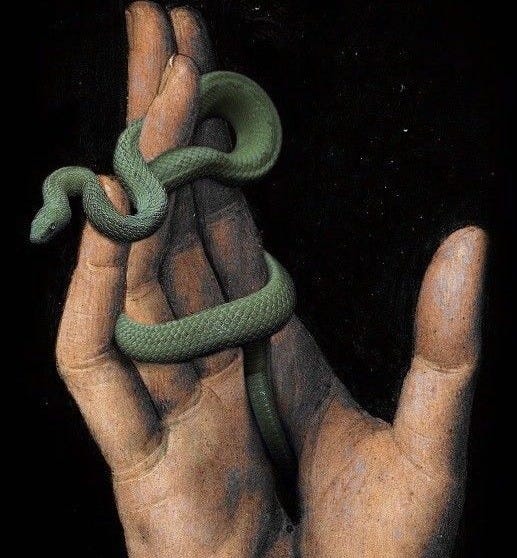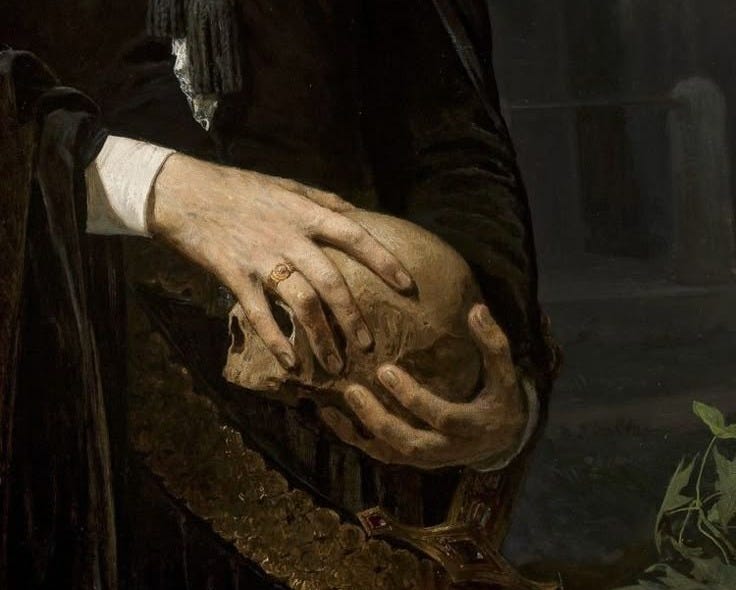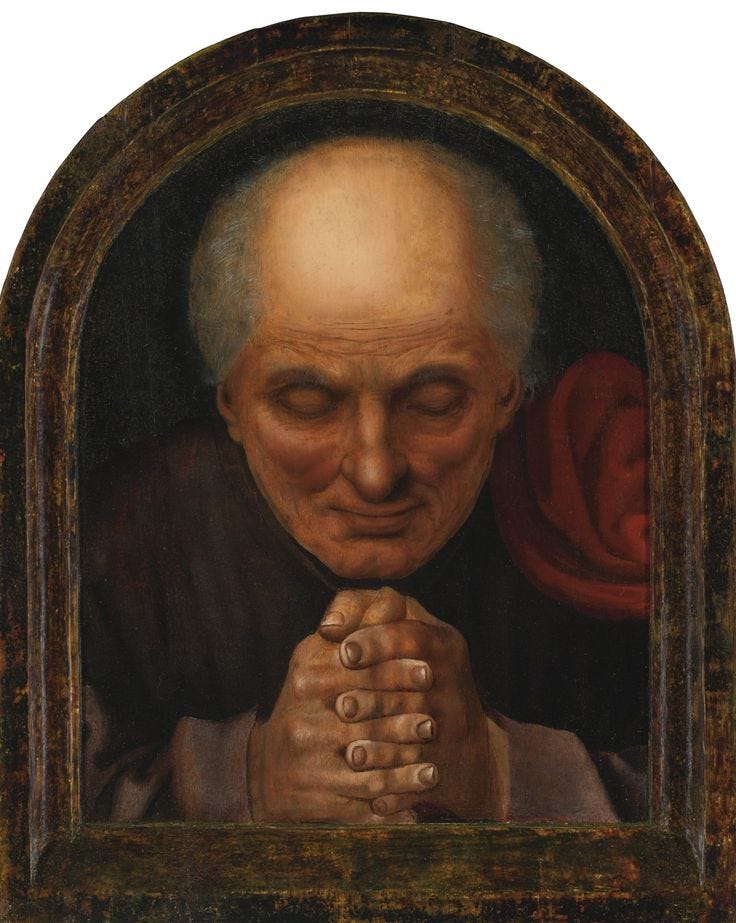Pride, Its Related Vices, and Its Remedies
Pride is an inordinate love of self which causes us to consider ourselves as our first beginning and last end.
If you don’t already know, this substack was born out of an instagram page. I’ve been posting about the spiritual life on instagram for years, and I’ve gathered a small but loyal group of amazing people who follow me.
Over the years, it was requested multiple times that I post my content beyond instagram, particularly by those who desired to delete the app and get away from social media, but still wanted to see the content. Substack fulfills that need.
A couple of weeks ago over on instagram, I polled my followers about what kinds of posts would be most helpful to them. The top four requests were Virtues, Saints, Prayer, and Catechism. Then I probed further — which virtues, specifically? which saints? The responses poured in, I organized a list, and I’ve been tackling it one by one ever since.
As I create and post these things, I will try to post them here for the benefit of those not on instagram, or those who prefer long-form content as opposed to squinting and swiping at a limited number of tiny squares on their phone. (me!)
By far, the most requested virtue was humility. But before we examine humility in depth (something I’ve already done on substack before, and I won’t post here again), I wanted to look at pride.
And so, without further ado…
*A vast majority of the following is extracted from The Spiritual Life by Rev. Adolph Tanquerey.
Pride
There is a legitimate sentiment which prompts us to prize what is good in us, and to seek the esteem of others, in the measure that it is useful.
We can and must prize the good which God has given us, acknowledging that He is its first principle and last end. This is a sentiment that honors God and makes for self-respect.
We may also desire that others see and appreciate the good that is in us and that they give glory to God for it, just as we ourselves must in turn recognize and appreciate their good qualities. This mutual regard fosters good relations among men.
Pride is a deviation of that legitimate sentiment.
Pride is when these tendencies go astray, or go beyond due limits.
At times, we forget that God is the source of these gifts and we attribute them to ourselves. This constitutes a disorder, for it denies that God is our first principle.
In like manner, we are tempted to act for self, or to gain the esteem of others, instead of acting for God, and of referring all honor to Him. This is again a disorder, for it denies that God is our last end.
This is the two-fold disorder of pride:
denying that God is our first principle
denying that God is our last end.
Definition of Pride:
”Pride is an inordinate love of self which causes us to consider ourselves, explicitly or implicitly, as our first beginning and last end. It is a species of idolatry, for we make gods of ourselves.”
The First Principal Form of Pride:
The first form of pride is to regard oneself, explicitly or implicitly, as one’s own first principle.
There are few who go as far as to consider themselves explicitly as their own first principle. This is the sin of atheists who willfully deny God because they want no master.
Explicitly Regarding Oneself as One’s Own First Principle:
This was the sin of Lucifer, who desired to rule himself and refused to submit to God.
The sin of our first parents, who wishing to be like God wanted to know of themselves what is good and what is evil.
The sin of heretics who, like Luther, refused to acknowledge the authority of the Church established by God.
The sin of rationalists who, in their pride of intellect, refuse to submit their reason to faith.
This is also the sin of certain intellectuals , who, too proud to accept the traditional interpretation of dogmas, attenuate and deform them to make them conform to their own views.
Implicitly Regarding Oneself as One’s Own First Principle:
A greater number fall into this fault implicitly, by acting as if the natural and supernatural gifts which God has freely bestowed upon them were their own. True, they recognize in theory that God is their first principle, but in practice they esteem themselves beyond measure, as if they were the source of the qualities they possess.
Some delight in their qualities and worth as if these were due solely to themselves. “The soul,” says Bossuet, “seeing its own beauty, has delighted in itself and has become absorbed in the contemplation of its own excellence. It has failed for an instant to refer all it has to God; it has forgotten its own dependence; it has first centered upon self and then surrendered to it. But in seeking to free himself from God and the laws of justice, man has become the slave of his sin.”
Graver still is the pride of those who, after the manner of the Stoics, attribute to themselves the virtues they practice.
The pride of those who imagine that the free gifts of God are the wages due their own merits, or that their good works are more their own than God’s, Who in reality is their principal cause.
The pride of those who look complacently upon such good works, as if these were wholly their own.
Another form of pride is by exaggerating our personal qualities.
We close our eyes to our defects and look at our good qualities through a magnifying glass, and we end by attributing to ourselves qualities we do not possess, or which have only the appearance of virtue.
Thus, we give alms for show and we believe ourselves charitable when we are simply proud; we fancy we are saints because we enjoy sensible consolations, or because we have given expression to beautiful thoughts, or taken good resolutions, whilst in reality we have not advanced beyond the first few steps on the way to perfection.
Another form of pride is an unjust preference of self to others.
We examine others’ defects with a microscope while we are scarcely conscious of our own; we see the mote in the neighbor’s eye, but not the beam in our own.
At times we come, like the Pharisee, to despise our brethren; at other times, we unjustly lower them in our estimation, and we believe ourselves above, while in reality we are below them.
It is by the selfsame principle that we seek to lord over our brethren and have our superiority over them recognized.
In relation to our superiors, this pride takes the form of censure and fault-finding, prompting us to scrutinize minutely all their acts and movements. We want to pass judgment on all things, to control all things.
Thus, we render obedience far more difficult for ourselves; we find it hard to submit to authority and the decisions of superiors; even to ask their permission becomes a hardship. We aspire to independence, to be our own first principle.
The Second Principal Form of Pride:
The second form of pride consists in considering ourselves, explicitly or implicitly, as our last end.
We do this by performing our actions without referring them to God, and by desiring to be praised for them as if they were exclusively our work.
This fault proceeds from the first, for whoever looks upon himself as his own first principle wills also to be his own last end.
Hardly anyone explicitly considers himself as his own last end, except an atheist or an unbeliever.
Yet, many behave in practice, as if they shared in this error.
They want to be praised, to be complimented upon their good works, as if they themselves were the principal authors, and as if they were responsible only to themselves. Instead of referring all to God, they expect congratulations for success, as if all the honor were due to them.
Prompted by egotism, they act for their own ends, caring little for the glory of God, and still less for the welfare of their neighbor.
They even go so far as to think that others must organize their lives to please and serve them; thus they make themselves the center, and end toward which others are to gravitate. What else is this if not the unconscious usurpation of the rights of God?
Pride of the Pious: Expecting Consolations
There are devout persons who complain of God when He does not flood them with consolations; they pine with grief in the midst of dryness, and thus form the false idea that the aim of piety is the enjoyment of consolations, forgetting that the glory of God must be the supreme end of all our actions, including prayer and spiritual exercises.
Pride is a common fault that remains with us for our whole life.
We must acknowledge the fact that pride, under one form or the other, is a very common fault, even among those who follow the path of perfection.
It is a fault that stays with us through all the stages of the spiritual life and disappears only when we die.
Defects Born of Pride
Presumption: an inordinate desire and hope whereby we want to do things which are beyond our strength. Presumption added to pride begets ambition and an inordinate love of honors, dignities, and authority over others. When one presumes too much on his strength and considers himself superior to others, he naturally want to dominate and rule them, and impose his ideas upon them.
Vanity: an inordinate love for the esteem of others. It differs from pride, which is pleasure taken in one’s own excellence; but vanity generally springs from pride The disorder of vanity is in wanting to be held in esteem for one's own sake without referring rightful honor to God.
The Malice of Pride
St. Thomas says pride is the most grievous of sins because it is a refusal to submit to God’s sovereign will.
To want to be independent of God, and to refuse obedience to God or His lawful representatives, is a revolt against God and constitutes a mortal sin.
To attribute to oneself what comes from God, especially the gift of grace, is also a grievous fault, for it denies that God is the first principal of everything good.
If one acts for oneself to the exclusion of God, this denies God His right to be our last end.
The Effects of Pride
Unrestrained pride produces disastrous effects. The Fathers rightly teach that it is the root of all other vices, and it damages virtuous acts, since it causes men to perform them from selfish motives.
Pride deprives us of grace, since God resists the proud. Let us weigh well these words.
Pride deprives us of merit. One of the essential conditions for meriting is purity of intention. But the proud man acts for self or to please men, instead of acting for God.
Pride is the source of many faults and much unhappiness.
Remedies Against Pride
The greatest remedy against pride is the acknowledgment that God is the Author of all good, and therefore to Him alone belongs all honor and glory.
As the principal remedy against pride, Fr. Tanquerey recommends the remembrance of this: that of ourselves we are but nothingness and sin, and hence merit nothing but forgetfulness and contempt.
We are nothing:
a. I am nothing
b. of myself, I can do nothing
c. I am worth nothing.
I am a sinner
We are but nothingness. Beginners must form this conviction through meditation, by pondering the following three thoughts: I am nothing, I can do nothing, I am worth nothing.
a) I am nothing. It is true that the divine goodness has chosen me out of millions of possible beings, to give me my existence, to endow me with life, with a spiritual and immortal soul, and for this I am bound to thank Him daily. Yet, I came from nothing, and by the very force of my being I tend towards nothingness, where I should surely return were it not for the abiding action of my Maker which sustains me. My being, then, is not mine, but is wholly God’s, and it is to Him that I must render homage. This being God has given me is a living reality, which I shall never be able to return Him due thanks. Yet, wondrous as this being of mine is, side by side with the God-head it is as mere nothingness: “And my substance is as nothing before thee,” (Ps. 38:6) for it is so imperfect.
“We cannot ever know the infiniteness of God’s being unless we know our own nothingness; nor can we understand our own nothingness unless we have knowledge of the infiniteness of God’s being.”
-Fr. Benoit, The Holy Will of God
I. This being is a contingent being, which could well cease to exist without detracting anything from the world’s perfection.
II. It is a borrowed being, given to me on the explicit condition of remaining under God’s supreme dominion.
III. It is a frail being, unable to subsist of itself, a being that ever needs the unceasing sustaining power of its Maker.
IV. Such being is, therefore, essentially dependent upon God, and has no other reason for its existence than that of giving glory to its Creator.
To forget this dependence, to act as if our good qualities were absolutely our own, and to boast of them is an error hard to conceive; it is madness and injustice.
What we say of man in the order of nature is even more true in the order of grace.
By grace we share in the life of God, from where all our worth and grandeur issue. Grace, which is essentially a free gift of God and of Jesus Christ, we cannot keep for long without the help of God, and wherein we cannot grow without His supernatural concurrence. For this especially we must say: “Thanks be to God for His unspeakable gift.”
b) Of myself, I can do nothing. I have received from God wondrous powers that enable me to know and love truth and goodness. These faculties have been perfected by the supernatural virtues and the gifts of the Holy Ghost. These gifts of nature and of grace blending so harmoniously and complementing one another so perfectly surpass all wonder. Yet, of myself, of my own accord, I can do nothing to set them in motion to work out their perfection. I can do nothing in the natural order without the concurrence of God; I can do nothing in the supernatural order without actual grace.
I cannot even conceive a good thought unto salvation, nor a desire supernaturally good, with God‘s grace. Knowing this, can I take pride in those natural and supernatural powers as if they were entirely my own? Here again there would be ingratitude and madness and injustice.
C) I am worth nothing. In truth, if I consider what God has placed within me, what He works, in me through His grace, I am worth a great deal, I am beyond price: “For you are bought with a great price,” .... I am worth the price which was paid for me, and the price paid for me was the blood of God Himself! Does the glory of my redemption and of my sanctification belong to me or to the Almighty?
“But still,” urges my vanquished self-love, “I have something that is my own, something that invests me with greatness: my free co-operation with God’s concurrence and His grace.”
Indeed, we have therein our share, yet not the principal share. That free consent is the mere exercise of faculties freely bestowed on us by God, and at the very moment we give it, God is working within us as its principal cause: “For it is God who worketh in you, both to will and to accomplish.” Besides, for the one time that we agree to follow the impulse of grace, how many times are there when we resist grace or co-operate only half-heartedly?
Truly, there is nothing wherein we should glory; rather there is cause for humiliation.
Therefore, from whatever point of view we see ourselves, whether we consider the great worth of the gifts we have been endowed with, or the great value of our merits themselves, we find no cause for boasting, but cause for paying tribute to God and for thanking Him from our inmost heart.
Moreover, we find that we have to beg His pardon for the bad use we have made of His gifts.
I am a sinner. And as such I merit contempt, all the contempt which it may please God to heap upon me.
“The only remedy for pride is humility. Humility is the fundamental virtue by which a person remembers his utter dependence on God, God’s laws, and God’s providence; and the utter folly of any action or any judgment or any self-glorification that is contrary to the will of God.”
- Fr. Donald Miller, CSSR
Helps and Counsels Against Pride
Realize that humility is the foundation of all the other virtues, it keeps us mindful of our complete dependence on God and the need we have for accepting and accomplishing His will.
Learn to detest pride as the cause of all sin, the reason for the creation of hell, and the source of all evil in the world.
Have consciousness of the punishment you deserve for your sins, and be ready to accept any trial or hardship from God to atone for those sins.
Be convinced of how foolish it would be to set up your own judgment & little knowledge against the teachings of Christ & His Church, against God’s knowledge of everything.
“Humility is the only thing which no devil can imitate.” -St. John Climacus
“Nothing glorifies God so much as the triumph of His grace in a soul that acknowledges her misery, her weakness, her unworthiness, and that hopes for all from His power and goodness.” -Bl. Columba Marmion
“Lord, I recognize You as the one whom all creatures must obey and I submit myself entirely to Your Divine Majesty.” -St. Vincent de Paul
If you asked me what is the most fundamental thing in religion, I should answer: it is humility. What is the second? what is the third? I should still reply: It is humility.” - St. Augustine












Thanks again, much needed read.